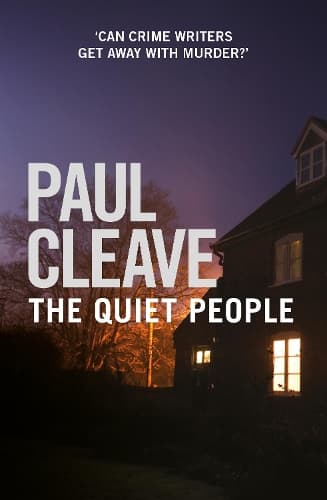Review: The Quiet People
Reviewed by Greg Fleming
Christchurch’s Paul Cleave - who The New Zealand Listener dubbed “the Crown Prince of Antipodean crime” - is one of the stars of the second wave of the crime fiction in Aotearoa. His deft, clever stories – often laced with a dose of horror and supernatural - have deservedly generated a large international following and won numerous awards including topping our own Ngaio Marsh crime fiction awards no less than three times.
But perhaps the greatest mystery surrounding the peripatetic and Frisbee-loving Cleave - who is apparently the nicest guy you’ll ever meet - is why he isn’t better known here? Cleave’s twelfth novel shares some territory with 2015’s Trust No One, where a crime writer with Alzheimer’s contends that his stories of murder aren’t fiction at all.
The Quiet People spells out its premise on the cover: “can crime writers get away with murder?” This time Cleave adds another dimension of horror, the victim here is the husband and wife crime writing duo’s seven year old son.
At first it appears Zach has been kidnapped by a stranger. Then the police suspect that the scene has been staged and the prime suspects are the parents. Cleave gives readers a prologue that points to their innocence but who, in Cleave’s world of unreliable narrators, can you trust?
It hasn’t helped that our protagonist, semi-successful, now fading, mid-career author Cameron Murdoch, had man-handled children in a bouncy castle the day before as he searched for Zach - always a difficult kid - who’d momentarily gone missing.
Things get worse when a high-profile journalist and sworn enemy of the pair - something to do with a book idea filched - focuses on the case. That leads to a disastrous press conference on live TV where Cameron loses all public sympathy. Nor are the couples’ protestations of innocence helped by their comments on various book panels during the years, which soon surface. There they boast about their crime IQ and the deficiencies of the police: “Kidnapping is all about becoming a magician. You get the police to look here instead of there.” It's all catnip for the media.
Soon there are protestors outside their house carrying placards labelling them child killers, the verdict already clear-cut in their minds; not to mention the multitude of one star reviews and online abuse on their social media channels. Murder isn’t always good for business.
The pressures of the job are clearly on Cleave’s mind, “…people ask me all the time, ‘you must have a sick mind, right, to come up with these ideas?’ So, I wanted to tell a story where writers would be judged on the things they have written or said in the past… we say and write some pretty crazy stuff. Should we be judged by that? The writers in this book are.”
Though The Quiet People is strictly based in the real-world, at times Cameron dialogues with a dark alter-ego he calls “Mr What-if,” a voice that must sit uncomfortably on many crime writers’ shoulders as they work. It’s a voice that blurs the border between imagination and reality but one that’s vital to dream up ever more hor-rific crimes to satiate a waiting audience.
The “quiet people” of the title refers to that moment when a reporter interviews the astonished neighbour of a crime scene: “We can’t believe he killed his boss. He was always so quiet, always keeping to himself.” But perhaps Cleave has his readers in mind, too.
While it’s difficult to say more without spoilers, prepare for an action-packed second half where Mr What-if gets the upper hand and the volume’s amped to 10. How you respond to that sudden metamorphosis, and some rather bizarre motivations from a key character we’ve never really got to know, will determine whether you judge this another Cleave success or a promising premise mishandled.
Reviewed by Greg Fleming
See in New Books
